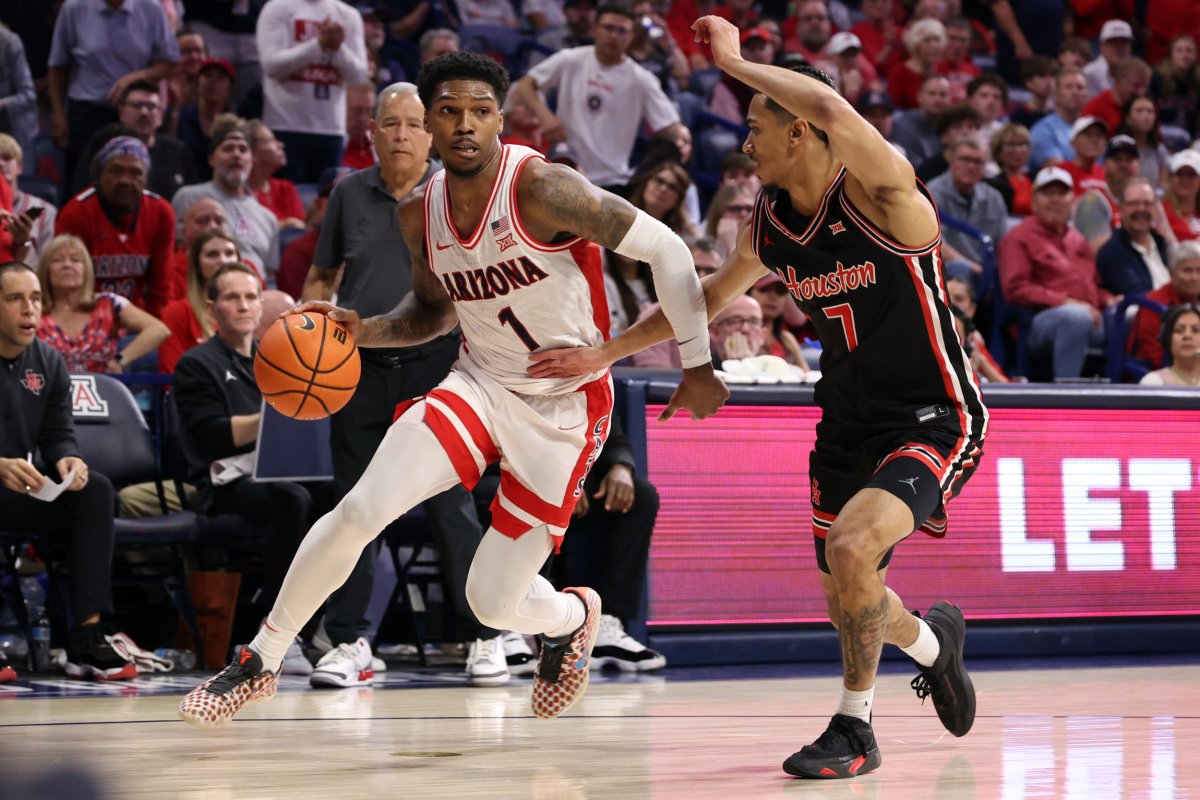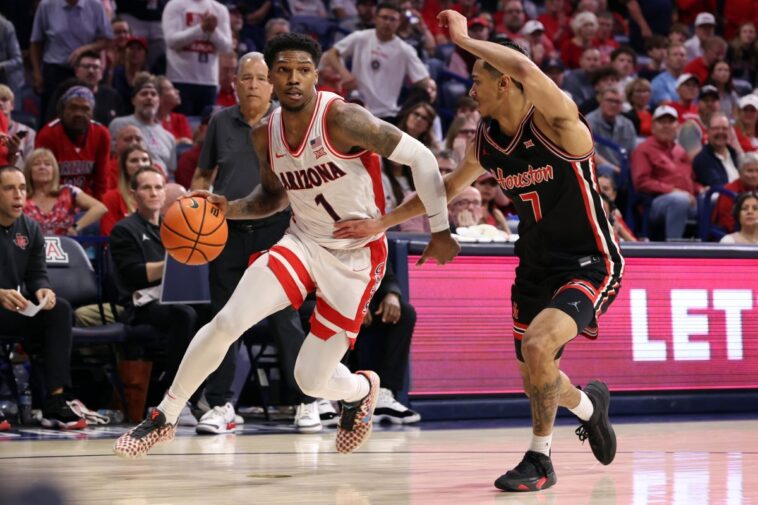

Televised Tussles and the Legal Landscape of Free Sports Streaming
The recent Big 12 Championships have once again shone a bright spotlight on the interplay between sports, digital broadcasting, and the law. As the No. 2 ranked Houston Cougars and the Arizona Wildcats prepare to face off at the T-Mobile Center in Kansas City, Missouri, a debate is unfolding that reaches beyond the boundaries of the basketball court. While fans are eagerly lining up for free streaming options and TV channel broadcasts, the legal underpinnings of such media distribution are filled with twists and turns, confusing bits, and complicated pieces that are just as intriguing as the game itself.
In recent times, live sports streaming has evolved from a niche hobby into a central part of mainstream sports consumption. But as more platforms offer free trials on services like Fubo, DirecTV Stream, Sling, and ESPN+, the legal framework governing these broadcasts, contractual rights, and consumer protections is loaded with issues. In this editorial, we will poke around some of the key legal implications that concern broadcasters, sports leagues, and the viewing public.
Free Streaming and the Contractual Right to Broadcast Sports
With the increasing competition among streaming providers, many fans now enjoy a host of free trial offers to watch the championship games. This readily available access has significant legal ramifications, especially in terms of contractual agreements and intellectual property rights. The recent availability of free streaming options for the Houston Cougars versus Arizona Wildcats showdown brings the legal debate to the fore. Fans can sign up for free trials on platforms like Fubo, DirecTV Stream, and Sling, each offering unique pricing models and subscriber benefits. However, it is important to understand that these free trials come with legal agreements that contain fine points and small twist conditions.
For example, the terms and conditions of these free trials often specify that access is temporary, and certain restrictions apply to sharing or redistributing the streamed content. While the digital era has made content more accessible, it has also complicated the very contractual relationship that viewers enter into when they click “submit.” The fine details are critical and demand that consumers read the full terms of service, lest they unintentionally breach the fine points of their agreements.
Key Contractual Considerations for Streaming Services
- Access Limitations: Temporary streams and trial periods mean that viewers have a limited window to watch the game. Once the trial lapses, additional charges might be incurred.
- User Agreements: Each platform has its own set of legal rules regarding content use. It is essential to take a closer look at these documents to figure a path through what you’re consenting to.
- Intellectual Property Rights: Live broadcasts of sporting events fall under strict copyright laws, and even free streaming services are not exempt from adhering to these legal standards.
- Data Privacy Concerns: By signing up for a free trial, consumers often provide personal information that may be subject to third-party sharing as detailed in the privacy policies of the streaming service.
The contractual architecture that underlies streaming trials is not just a set of passive terms, but rather a web of legal responsibilities that affects consumers and providers alike. Understanding these conditions is super important, as the stakes are high in protecting intellectual property and ensuring fair use. With the rapid growth of digital streaming, legal professionals and consumers alike must get into the details to avoid stumbling over the hidden complexities in these kinds of contracts.
Broadcast Rights and Legal Boundaries in Competitive Sports
At the crux of the debate over free streaming and TV broadcasts is the issue of broadcast rights. Television networks like ESPN, which will air the Houston Cougars versus Arizona Wildcats game live, have been embroiled in legal battles over the rights to air sports events. The legal contracts between leagues, teams, and broadcasters are often tangled with issues that require a deep understanding of the little details and the subtle parts of contract law.
Broadcast rights cover a wide spectrum of legal topics – from licensing fees to territorial restrictions and digital media rights. As new legal challenges emerge, the enforcement of these contracts often involves negotiating through nerve-racking guidelines that can be overwhelming for both viewers and providers. Moreover, the digital transformation has forced traditional broadcasters and streaming platforms to sort out a new set of tangled issues about who gets to stream what, where, and for how long.
Overview of Legal Aspects in Broadcast Rights
| Aspect | Description | Legal Considerations |
|---|---|---|
| Licensing Agreements | Contracts that grant rights to broadcast or stream games. | Terms of use, territorial limitations, exclusivity clauses. |
| Digital Distribution | Online streaming platforms and their regulatory frameworks. | Copyright enforcement, consumer data privacy. |
| Advertising Rights | Agreements related to in-game or during-broadcast advertisements. | Revenue sharing models, local market rules. |
| Consumer Protections | Ensuring viewers are not misled regarding the terms of viewership. | Clear communication of trial periods, cancellation policies. |
These contractual elements form an essential mosaic that is constantly being reconfigured as technology and consumer expectations evolve. The broadcast rights for a championship event such as the Big 12 Finals are a dynamic arena in which the legal rules are both a tool and a battleground for fairness, accessibility, and profit.
Consumer Protection in the Age of Digital Streaming
As free trials and discounted subscriptions become super important in attracting audiences, consumer protection laws remain key in ensuring that viewers are not misled. The legal safeguard in the digital age is more than just a set of rules—it is a framework designed to protect those who are often navigating a maze of confusing bits and nerve-racking legal jargon. Service providers must clearly articulate their cancellation policies, data usage terms, and any potential fees that may arise when the trial period ends or when subscriptions automatically renew.
Legally, the consumer must get into the full texts associated with their sign-ups. However, the average fan may find it intimidating to sort out all the fine points without legal aid, making consumer education a must-have component in this environment. Lawmakers are increasingly calling for transparency and clearer communication from streaming services to ensure that the little details do not catch consumers off guard.
Best Practices for Consumers When Signing Up for Streaming Services
- Read the Fine Print: Ensure you understand the terms and any potential charges after the free trial period.
- Understand Data Usage: Know what personal data is collected and how it is shared with third parties.
- Set Reminders: Mark the end of the free trial period on your calendar to avoid unplanned charges.
- Use Trusted Providers: Verify which platforms are recognized as legitimate to avoid falling prey to scams or unauthorized content streams.
- Advocate for Transparency: Engage with consumer forums and legal advocacy groups to push for clearer communication on policies.
These steps, while seemingly simple, are grounded in legal principles designed to balance the rapid pace of technological innovation with the need to protect consumer rights. It is essential for viewers to understand that every click on a “free trial” button may involve a legal commitment that should be taken seriously.
Legal Challenges in Sports Broadcasting in a Digital World
The digital transformation has ushered in a host of legal challenges in the realm of sports broadcasting. Traditional broadcast models are being upended by online streaming platforms, which, while providing more freedom to consumers, also complicate the legal landscape. Issues such as licensing disputes, territorial restrictions, and unauthorized streaming are but a few of the intimidating legal battles currently raging in the backdrop of the sports world.
Legal experts have organized debates around whether current intellectual property laws adequately protect sports content in an era where digital dissemination is the norm. The streaming options available for watching the Houston Cougars versus Arizona Wildcats game illustrate just how loaded with issues the modern sports broadcast industry has become. These problems require lawmakers, networks, and courts to carefully sort through an array of little twists to maintain a fair balance between accessibility and profit protection.
Important Legal Issues Pertaining to Digital Sports Broadcasting
- Copyright Violations: Unauthorized streaming and piracy are persistent issues that not only undermine revenue but also infringe on the proprietary rights of content creators.
- Geographical Restrictions: Licensing agreements often limit where content can be broadcast, making it challenging for fans in certain regions to access the games legally.
- Contract Enforcement: The digital age has revealed significant gaps between traditional contract law and modern streaming agreements, requiring updated legal frameworks.
- Consumer Rights vs. Corporate Interests: Striking a balance between the free exchange of information and the rights of corporations to protect their intellectual property remains an ongoing legal debate.
These points underscore the pressing need for a reevaluation of current legal statutes governing digital media. As live sports events become an integral part of social and economic life, lawmakers must take a closer look at the existing legal structures surrounding broadcast rights and adapt them to modern realities.
Breaking Down the Legal Implications of Free Streaming Offers
At first glance, the promise of free viewing for championship games—through services such as Fubo’s free trial, DirecTV Stream’s trial periods, or Sling’s competitive plans—appears to be a win for the consumer. However, beneath this attractive benefit lies a host of nerve-racking legal concerns. The legal obligations that accompany these offers are intertwined with the everyday practices of digital media distribution, making it essential to sort out the key issues.
Legal analysis reveals several problematic areas in these free streaming offers:
- Temporary Access: Free trials are always limited in time, with strict conditions governing their usage and termination. Consumers must be aware that the initial “free” period can quickly turn into a paid subscription if not managed carefully.
- Data Collection and Privacy: Signing up for any service typically involves sharing personal details. These details can be used or shared in ways that consumers might not anticipate, particularly if privacy policies are vague or overly broad.
- Hidden Fees or Automatic Renewals: Consumers must be alert to any clauses that allow automatic billing after the trial expires, as these forces may be overlooked in the labyrinth of legal text.
- Geo-blocking and Access Restrictions: Some free trial offers may not be accessible in every location, complicating matters for fans who could otherwise legally enjoy games on their preferred devices.
Each of these issues invites a bevy of legal challenges that, if left unresolved, could lead to consumer confusion or even litigation. The fine details of each service provider’s user agreement are essential reading, as they hold the key to understanding how consumer rights are both protected and potentially compromised in the digital realm.
The Role of Consumer Advocacy in Digital Broadcasting
In an era where digital streaming is quickly becoming the primary method of consuming live sports, consumer advocacy groups have a super important role to play. These organizations strive to break down the tangled issues hidden within the terms and conditions of streaming services. Their mission is not only to educate viewers on how to steer through legal intricacies but also to push for reforms that enhance transparency and fairness in the digital market.
Consumer advocacy has been actively involved in lobbying for changes in federal and state laws. The aim is to whip up a legal environment where all parties—whether service providers, broadcasters, or fans—can enjoy their rights without being bogged down by misleading or overly complex legal agreements. By engaging in discussions with lawmakers, these organizations help shape policies that safeguard personal data, ensure clarity in subscription terms, and protect against the hidden pitfalls of free trials.
Strategies Employed by Consumer Advocacy Groups
- Public Awareness Campaigns: Running initiatives that help viewers understand the fine print before they sign up.
- Legal Workshops: Hosting seminars and workshops to educate consumers on their digital rights and data privacy laws.
- Lobbying Efforts: Working with policymakers to craft legislation that ensures transparency and fair practices in digital streaming.
- Support Networks: Establishing community forums where consumers can share their experiences and advice on avoiding hidden fees or contractual traps.
These strategies not only empower consumers but also foster an environment of accountability for streaming services. As the legal landscape around digital broadcasting matures, it becomes increasingly clear that consumer advocacy will be essential in ensuring that the promise of free, high-quality streaming does not come at the expense of consumer rights.
The Economic Impact of Digital Broadcasting on Sports Franchises
Another layer in this increasingly complex legal discussion is the economic impact of digital broadcasting on sports franchises and leagues. Free streaming options, while beneficial for consumers, can sometimes challenge the financial models that support these organizations. The delicate balance between providing free access and sustaining revenue through broadcast rights fees is a nerve-racking challenge riddled with tension for all parties involved.
From a legal perspective, revenue-sharing agreements embedded in broadcasting contracts are critical. These mechanisms are designed to ensure that while fans might enjoy free introductory offers, the sports franchises and networks still receive the compensation necessary to fund teams, infrastructure, and growing digital platforms. When these agreements are not correctly enforced or renegotiated, the economic foundations of sports franchises can be jeopardized.
Economic Considerations and Legal Agreements for Sports Broadcasting
| Economic Aspect | Legal Consideration | Potential Impact |
|---|---|---|
| Revenue Sharing | Terms in broadcasting contracts specifying fee divisions. | Ensures funds flow back to sports leagues and teams. |
| Licensing Fees | Fixed fees for broadcast rights, subject to contractual renegotiation. | Sustains financial stability for leagues. |
| Digital Exclusivity | Contracts detailing online streaming rights separate from traditional broadcasting. | Manages competition among various platforms. |
| Audience Analytics | Data collection agreements that impact advertising revenue. | Directly influences the bargaining power of broadcasters. |
Ensuring that all parties involved find their path through such economic and legal complexities is challenging. Legal professionals must take a closer look at these revenue models to advise on contracts that are both fair and adaptive to the rapidly changing digital broadcasting environment. For fans, understanding these arrangements can also shed light on why certain streaming options or subscription models exist, and how they ultimately benefit—or potentially hinder—the overall sports experience.
Balancing Innovation with Legal Safeguards in Sports Broadcasting
Innovation in digital broadcasting has been a double-edged sword. On one side, it democratizes access to live sports events, allowing fans from all walks of life to enjoy high-quality streaming. On the other, it introduces a number of nerve-racking legal challenges that require careful legislation and regulation. The dynamic between technological advances and the need for robust legal safeguards is as delicate as a well-played basketball game, replete with unexpected twists and turns.
For instance, while new technologies allow for easier access to free trials and lower-cost streaming options, they also expose users to data privacy risks and potential contractual pitfalls. As streaming services continue to innovate, lawmakers must work hand-in-hand with industry experts to craft regulations that are both innovative and protective of consumer and corporate rights alike.
Essential Legal Safeguards to Consider
- Clear Data Privacy Standards: Protective measures should be in place to monitor and regulate the data collection practices of streaming services.
- Transparent Contractual Terms: Legal agreements need to be written in clear, accessible language that demystifies the fine details for the average consumer.
- Fair Competition Laws: Regulations that prevent a monopoly in sports broadcasting help preserve the balance between different streaming services and television networks.
- Periodic Contract Reviews: Regular assessments of existing contracts ensure that negative aspects of hidden complexities are addressed and updated in line with technological advancements.
Balancing these factors is not a small feat. It calls for creative legal thinking as well as a willingness to work through the confusing bits of modern digital law. Legal professionals must dig into each component—whether related to data privacy, contractual fairness, or consumer rights—to ensure that innovation does not outpace the necessary safeguards.
The Future of Sports Broadcasting and Legal Adaptation
Looking ahead, the evolution of digital streaming in sports broadcasting promises both exciting advancements and new legal hurdles. The upcoming Houston Cougars versus Arizona Wildcats game is a microcosm of the broader trends, showcasing how free streaming options, free trials, and integrated digital platforms are not just changing how we watch sports, but also how legal frameworks must adapt.
Legal experts predict that in the coming years, the relationship between broadcasters, streaming platforms, and consumers will continue to evolve. New legal models that account for temporary access, layered revenue-sharing agreements, and consumer protections will be developed. This ongoing evolution will require lawmakers, industry leaders, and legal professionals to work together to figure a path through persistent legal challenges.
Trends to Watch in the Sports Broadcasting Legal Arena
- Increased Regulation on Data Privacy: With more personal data at stake, stronger privacy laws and enforcement measures are expected to become a staple of digital sports streaming.
- Evolution of Streaming Contracts: Contracts will likely become more straightforward, ensuring that the fine points and hidden complexities are communicated in an accessible manner.
- Emergence of New Dispute Resolution Methods: As disputes over broadcast rights and free streaming conditions grow, alternative dispute resolution mechanisms such as arbitration may see wider adoption.
- Focus on Cross-Border Streaming Rights: International streaming will prompt legal debates around territorial rights and global accessibility, requiring cooperative regulatory frameworks.
Each of these trends highlights the need for a balanced approach to innovation and protection in the sports broadcasting arena. As the law adapts to new digital realities, the principles of fairness, transparency, and clear communication must remain at the forefront of all contractual and regulatory changes.
Legal Reflections on the Intersection of Entertainment and Digital Media
In conclusion, the upcoming Big 12 Championship featuring the Houston Cougars and the Arizona Wildcats serves as a practical case study that illuminates the nerve-wracking intersections between live sports, technological innovation, and the legal landscape. What might appear to be a straightforward sports broadcast is actually a tapestry woven from many legal threads, including contract law, intellectual property rights, and consumer protection statutes.
From the evolution of free trial streaming services to the delicate balance of broadcast rights, the digital age has brought forth an array of legal challenges that require all stakeholders to work through tangled issues and subtle parts of the contracts at hand. Legal professionals are tasked with taking a closer look at each element, ensuring that the law remains flexible enough to encourage innovation, yet robust enough to protect consumer and corporate rights.
As viewers sit down to enjoy a basketball game from the comfort of their homes, whether through a traditional cable subscription or a free streaming trial, it is worth noting that behind the scenes, litigation, regulation, and contractual negotiations are all working in tandem to protect and promote the sport. The legal journey that accompanies every broadcast reminds us that while technology may offer easier access to content, it also ushers in a set of legal implications that require careful deliberation and transparent regulation.
The Role of Legal Oversight in Shaping the Future of Sports Entertainment
One cannot overstate the key role that legal oversight plays in this rapidly evolving sector. Without a robust legal framework, the very freedoms that digital media offers could become avenues for exploitation or mismanagement. In this context, it is super important for policymakers, lawyers, and industry experts to work together to clarify and enforce the rules that govern sports broadcasting.
Legal oversight not only helps in resolving disputes that arise between streaming platforms and traditional networks, but also paves the way for consumers to enjoy their favorite sports content without the hidden pitfalls of obscure contractual clauses. As digital media continues to blur the lines between accessibility, revenue generation, and intellectual property, legal professionals must take a proactive role in judging and shaping the regulatory environment.
Key Areas Requiring Legal Vigilance
- Intellectual Property Protection: Ensuring that creators and rights holders receive fair compensation in an era of digital reproduction.
- Consumer Data Protection: Developing stronger safeguards to prevent misuse of personal information collected during free trials and subscriptions.
- Fair Licensing Agreements: Promoting transparency in licensing arrangements to prevent unfair restrictive practices.
- Regulatory Updates: Continuous revisions of existing laws to keep pace with technological advancements and changes in market practices.
These key areas of focus underline the super important intersection where law meets technology in the sports broadcasting landscape. Through continuous legal vigilance, the industry can not only foster innovation but also maintain a fair competitive environment that benefits all stakeholders from the broadcaster to the end consumer.
Final Thoughts: The Harmonious Dance of Law and Basketball
Ultimately, the fascinating world of sports broadcasting offers much more than just entertainment. It is a stage where the legal world and the entertainment industry come together to negotiate, collaborate, and sometimes clash over fundamental issues that affect us all. Whether you are a fan eagerly waiting to watch the Houston Cougars take on the Arizona Wildcats, or a legal professional keen to understand how contractual terms evolve in the digital media landscape, it is important to remember that every streaming service, every free trial, and every broadcast agreement is part of a larger, sophisticated dialogue between law and innovation.
In our ever-changing digital society, where technological innovation pushes us to explore new ways to watch live events, understanding and respecting the legal framework becomes crucial. As consumers benefit from innovative streaming services, the law must be agile and vigilant in addressing the little twists and subtle details that arise. This delicate balancing act is what ultimately preserves the spirit of competition in sports while ensuring that all parties—be it the broadcasters, the leagues, or the viewers—enjoy their rights and responsibilities in a fair and transparent manner.
As we look to the future, one thing remains clear: the harmonious dance between the legal field and the fast-paced world of sports broadcasting will continue to evolve. Each championship game, every free streaming trial, and all digital innovations represent not only a win for technology and entertainment but also a challenging journey through a maze of legal agreements, data protections, and intellectual property rights. And this journey, as complicated and nerve-wracking as it may sometimes be, is essential in bringing us closer to an entertainment landscape that is as just as it is exciting.
It is our responsibility—whether as legal editors, policymakers, or informed consumers—to continue taking a closer look at these developments, ensuring that the exhilarating world of sports remains accessible, fair, and respectful of the rights of every party involved. In doing so, we not only enhance our viewing experience but also contribute to a legal framework that is truly designed for the digital age.
Originally Post From https://www.oregonlive.com/collegebasketball/2025/03/where-to-watch-arizona-vs-houston-basketball-streaming-free-today-tv-channel-odds.html
Read more about this topic at
2025 Players Championship TV schedule, coverage, how …
2025 EFL Championship TV & Streaming Schedule


